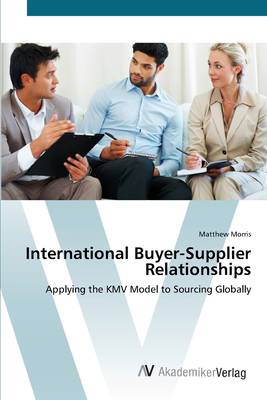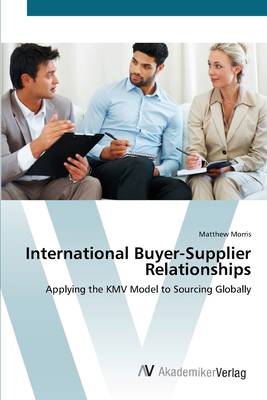
- Afhalen na 1 uur in een winkel met voorraad
- Gratis thuislevering in België vanaf € 30
- Ruim aanbod met 7 miljoen producten
- Afhalen na 1 uur in een winkel met voorraad
- Gratis thuislevering in België vanaf € 30
- Ruim aanbod met 7 miljoen producten
Zoeken
International Buyer-Supplier Relationships
Applying the KMV Model to Sourcing Globally
Matthew Morris
Paperback | Engels
€ 58,45
+ 116 punten
Omschrijving
Revision with unchanged content. Businesses and their supply chains are becoming more global each day. Many factors have combined to make sourcing outside the home country more financially lucrative for the firm. However, this trend has occasionally been frustrated by failures of undertakings and relationships with firms based in other countries. In many cases the realization of benefits from such relationships is dependent on the acknowledgement of differences between the cultures of the home countries of the firms involved. In fact, such dif-ferences may also influence the inception of the relationship itself. Here the author addresses the following questions: Which non-financial performance measures are important in buyer-supplier relationships? Is there a model for relationship-building applicable across various industries? How are such relationships affected by differences in national culture with regard to sup-pliers from a variety of countries? How important is cultural similarity in global sourcing? This book is addressed to researchers in supply chain management, purchasing, and organizational behaviour, as well as profes-sionals in supply chain management.
Specificaties
Betrokkenen
- Auteur(s):
- Uitgeverij:
Inhoud
- Aantal bladzijden:
- 144
- Taal:
- Engels
Eigenschappen
- Productcode (EAN):
- 9783639418446
- Verschijningsdatum:
- 27/05/2012
- Uitvoering:
- Paperback
- Afmetingen:
- 152 mm x 229 mm
- Gewicht:
- 222 g

Alleen bij Standaard Boekhandel
+ 116 punten op je klantenkaart van Standaard Boekhandel
Beoordelingen
We publiceren alleen reviews die voldoen aan de voorwaarden voor reviews. Bekijk onze voorwaarden voor reviews.











